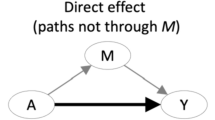Abstract
The author narrates a history of the development of her interest in integrating behavior into heath research and health care. Using diabetes as an exemplar, she describes some of the challenges of integrating behavior into health research and health care: (1) becoming a member of interdisciplinary research and health care teams; (2) acquiring funding for behavioral research with medical populations; (3) communicating scientific findings; and (4) acquiring reimbursement for psychological services rendered. Specific examples of how the author and other psychologists can address these challenges are provided.
Similar content being viewed by others
REFERENCES
Carmichael, S., Johnson, S. B., Baughcum, A., North, K., Hopkins, D., Dukes, M., et al. (2003). Prospective assessment in newborns of diabetes autoimmunity (PANDA): Maternal understanding of infant diabetes risk. Genetics in Medicine, 5, 77-83.
Diabetes Prevention Program Research Group. (2002). Reduction in the incidence of Type 2 diabetes with lifestyle intervention or metformin. New England Journal of Medicine, 346, 393-403.
Eastman, B., Johnson, S. B., Silverstein, J., Spillar, R., & McCallum, M. (1983). Understanding of hypo-and hyperglycemia by youngsters with diabetes and their parents. Journal of Pediatric Psychology, 8, 229-243.
Eriksson, K., & Lindgarde, F. (1991). Prevention of type 2 (non-insulin-dependent) diabetes mellitus by diet and physical exercise. Diabetologia, 34, 891-898.
Freund, A., Johnson, S. B., Rosenbloom, A., Alexander, B., & Hansen, C. (1986). Subjective symptoms, blood glucose estimation, and blood glucose concentrations in adolescents with diabetes. Diabetes Care, 9, 236-243.
Freund, A., Johnson, S. B., Silverstein, J., & Thomas, T. (1991). Assessing daily management of childhood diabetes using 24-hr recall interviews: Reliability and stability. Health Psychology, 10, 200-208.
Geffken, G., Lewis, C., Johnson, S. B., Silverstein, J., Rosenbloom, A., & Monaco, L. (1997). Residential treatment for youngsters with difficult-to-manage insulin dependent diabetes mellitus. Journal of Pediatric Endocrinology and Metabolism, 10, 517-527.
Haley, W., McDaniel, S., Bray, J., Frank, R., Heldring, M., Johnson, S. B., et al. (1998). Psychological practice in primary care settings: Practical tips for the clinician. Professional Psychology: Research and Practice, 29, 237-244.
Harkavy, J., Johnson, S. B., Silverstein, J., Spillar, R., McCallum, M., & Rosenbloom, A. (1983). Who learns what at diabetes camp. Journal of Pediatric Psychology, 8, 143-153.
Institute for the Future. (2000). Health and health care 2010: The forecast, the challenge. San Francisco: Josey-Bass.
Johnson, S. B. (1980). Psychosocial factors in juvenile diabetes: A review. Journal of Behavioral Medicine, 3, 95-116.
Johnson, S. B. (1992). Methodological issues in diabetes research: Measuring adherence. Diabetes Care, 15, 1658-1672.
Johnson, S. B. (1993). Chronic diseases of childhood: Assessing compliance with complex medical regimens. In N. Krasnegor, S. B. Johnson, L. Epstein, & S. Yaffee (Eds.), Developmental perspectives of health compliance behavior (pp. 157-184). Hillside NJ: Erlbaum.
Johnson, S. B. (1994). Health behavior and health status: Concepts, methods and applications. Journal of Pediatric Psychology, 19, 129-141.
Johnson, S. B. (2000a). Compliance behavior: Implications for biomedical research. In N. Krasnegor, N. Anderson, & D. Bynum (Eds.), Health and behavior (Vol. 1, pp. 371-384). Bethesda, MD: National Institutes of Health.
Johnson, S. B. (2000b). Compliance behavior in clinical trials: Error or opportunity? In D. Drotar (Ed.), Promoting adherence to medical treatment in childhood chronic illness: Interventions and methods (pp. 307-322). Mahwah, NJ: Erlbaum.
Johnson, S. B. (2001). Screening programs to identify children at risk for diabetes mellitus: Psycholological impact on children and parents. Journal of Pediatric Endocrinology and Metabolism, 14, 653-660.
Johnson, S. B. (2002). Participant experiences in the DPT-1: Preliminary results. Paper presented at a meeting of the NIH Type 1 TrialNet Study Group, Bethesda, MD.
Johnson, S. B., Baughcum, A., Carmichael, S., She, J. X., & Schatz, D. A. (2004). Maternal anxiety associated with newborn genetic screening for Type 1 diabetes. Diabetes Care, 27, 392-397.
Johnson, S. B., & Carmichael, S. (2002). At-risk for diabetes: Coping with the news. Journal of Clinical Psychology in Medical Settings, 7, 69-78.
Johnson, S. B., Freund, A., Silverstein, J., Hansen, C. & Malone, J. (1990). Adherence-health status relationships in childhood diabetes. Health Psychology, 9, 606-631.
Johnson, S. B. & Meltzer, L. (2002). Disentangling the effects of current age, onset age, and disease duration: Parent and child attitudes toward diabetes as an exemplar. Journal of Pediatric Psychology, 27, 77-86
Johnson, S. B., Perwien, A., & Silverstein, J. (2000). Responses to hypo-and hyperglycemia in adolescents with type 1 diabetes. Journal of Pediatric Psychology, 25, 171-178.
Johnson, S. B., Pollak, R., Silverstein, J., Rosenbloom, A., Spillar, R., McCallum, M., et al. (1982). Cognitive and behavioral knowledge about insulin dependent diabetes among children and parents. Pediatrics, 69, 708-713.
Johnson, S. B., Riley, W., Hansen, C. & Nurick, M. (1990). The psychological impact of islet cell antibody (ICA) screening: Preliminary results. Diabetes Care, 13, 93-97
Johnson, S. B., Silverstein, J., Rosenbloom, A., Carter, R., & Cunningham, W. (1986). Assessing daily management in childhood diabetes. Health Psychology, 5, 545-564.
Johnson, S. B., & Tercyak, K. (1995). Psychological impact of islet cell antibody screening for IDDM on children, adults, and their family members. Diabetes Care, 18, 1370-1372.
National Institutes of Health. (n.d.). The NIH almanac—Appropriations. Retrieved February 12, 2004, from http://www.nih.gov/about/almanac/appropriations/index.htm
National Institutes of Health. (2001). Behavioral and social sciences research at NIH. Retrieved February 12, 2004, from http://obssr.od.nih.gov/publications/NIHBSSR2001.pdf
National Center for Health Statistics. (2003). Health, United States, 2003. Hyattsville, MD: Author.
Pan, X., Li, G., Hu, Y., Wang, J., Yang, W., An, Z., et al. (1997). Effects of diet and exercise in preventing NIDDM in people with impaired glucose tolerance: The Da Qing IGT and Diabetes Study. Diabetes Care, 20, 537-544.
Reynolds, L. A., Johnson, S. B., & Silverstein, J. (1990). Assessing daily diabetes management by 24 hr recall interview: The validity of children's reports. Journal of Pediatric Psychology, 15, 493-509.
Author information
Authors and Affiliations
Rights and permissions
About this article
Cite this article
Johnson, S.B. Integrating Behavior into Health Research and Health Care: One Psychologist's Journey. Journal of Clinical Psychology in Medical Settings 11, 91–99 (2004). https://doi.org/10.1023/B:JOCS.0000025720.16458.01
Issue Date:
DOI: https://doi.org/10.1023/B:JOCS.0000025720.16458.01




